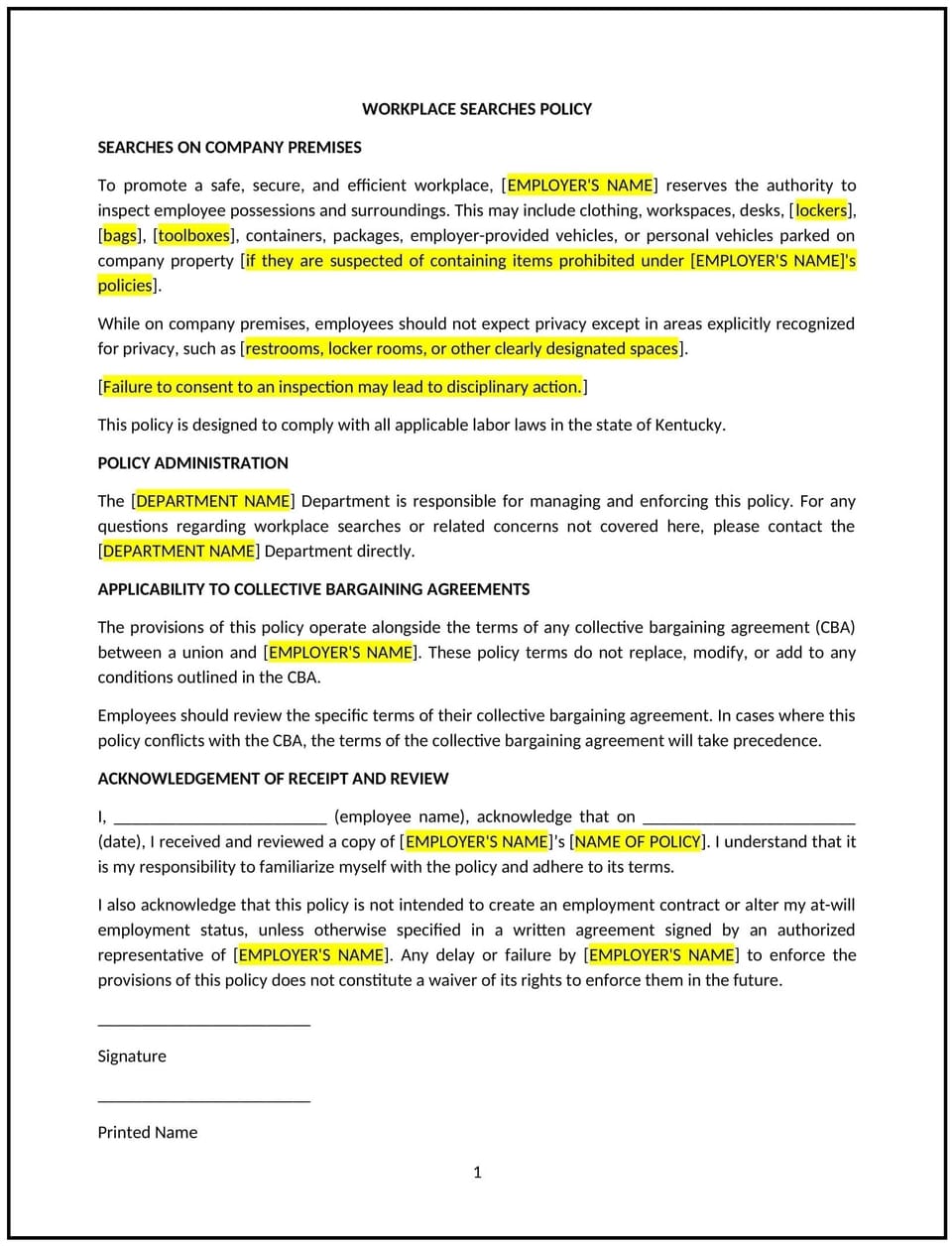Workplace searches policy (Kentucky): Free template

Workplace searches policy (Kentucky)
A workplace searches policy provides Kentucky businesses with guidelines for conducting searches of employees, their workspaces, and personal items in accordance with company needs and legal rights. This policy ensures that searches are carried out consistently, legally, and respectfully, balancing the need for security and privacy.
By adopting this policy, businesses can maintain a safe and secure workplace while protecting both company property and employee rights.
How to use this workplace searches policy (Kentucky)
- Define scope: Specify the types of searches covered by the policy, such as searches of personal items, desks, lockers, or vehicles on company property.
- Set clear criteria for when searches can be conducted: Outline situations where searches may be necessary, such as suspected theft, workplace violence, or violation of company policies.
- Address legal considerations: Ensure that searches are conducted in compliance with Kentucky state laws and federal regulations, respecting employee privacy rights while maintaining safety.
- Outline consent procedures: Specify whether employees are required to consent to searches and the process for obtaining consent, especially if personal items are involved.
- Include confidentiality measures: Emphasize that searches will be conducted with discretion, and any sensitive information uncovered will be kept confidential unless required by law.
- Specify who can conduct searches: Designate authorized personnel, such as HR representatives or security staff, who are allowed to perform searches.
- Address employee rights: Make employees aware of their rights during searches and provide them with information on how to report concerns regarding the process.
Benefits of using this workplace searches policy (Kentucky)
This policy provides several key benefits for Kentucky businesses:
- Enhances workplace security: Helps protect company property, prevent theft, and ensure a safe working environment.
- Reduces legal risks: Provides a clear framework for conducting searches legally and respectfully, minimizing the potential for lawsuits or claims of privacy violations.
- Ensures consistency: Establishes uniform procedures for searches, ensuring fairness and transparency across the organization.
- Protects employee privacy: Balances the need for security with respect for employee privacy rights, maintaining trust between employees and the business.
- Promotes compliance: Ensures that searches align with Kentucky and federal laws regulating employee privacy and workplace searches.
Tips for using this workplace searches policy (Kentucky)
- Communicate the policy: Ensure that employees are aware of the policy and its procedures by including it in the employee handbook and conducting training sessions.
- Obtain consent: Make it clear whether employees must provide consent for searches and how this consent will be documented.
- Ensure transparency: Be transparent about the circumstances under which searches may be conducted and ensure employees know their rights.
- Provide regular reminders: Reinforce the policy through periodic reminders, such as during safety meetings or employee communications.
- Review periodically: Update the policy to reflect changes in Kentucky laws, workplace needs, or security protocols.
Q: What types of searches are covered by this policy?
A: This policy covers searches of personal items, workspaces, desks, lockers, or vehicles on company property, if deemed necessary under certain circumstances.
Q: Under what circumstances can workplace searches be conducted?
A: Searches may be conducted if there is reasonable suspicion of misconduct, such as theft, violation of company policies, or safety concerns.
Q: Do employees need to consent to workplace searches?
A: The policy will specify whether employees are required to consent to searches and the process for obtaining consent when necessary.
Q: Who is authorized to conduct searches?
A: Searches should be carried out by designated personnel, such as HR representatives or security officers, who are trained in proper procedures.
Q: Are searches conducted confidentially?
A: Yes, all searches are carried out with discretion, and any sensitive information discovered is kept confidential unless legally required to be disclosed.
Q: What happens if an employee refuses to consent to a search?
A: The policy will outline the consequences for refusal, which may include disciplinary action, depending on the situation and the business’s needs.
Q: How are employees' privacy rights protected during searches?
A: The policy ensures that searches are conducted in accordance with Kentucky state laws and federal regulations, balancing the need for security with respect for employee privacy.
Q: How often should this policy be reviewed?
A: The policy should be reviewed periodically to ensure it aligns with Kentucky laws, evolving security needs, and business practices.
This article contains general legal information and does not contain legal advice. Cobrief is not a law firm or a substitute for an attorney or law firm. The law is complex and changes often. For legal advice, please ask a lawyer.


